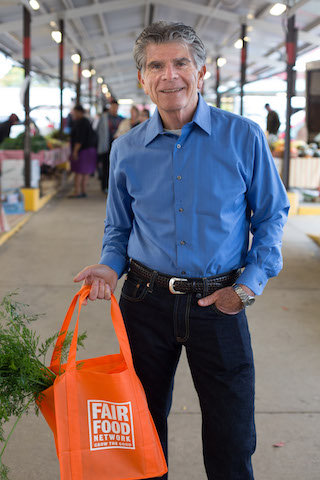Fair food advocate has UC roots
April 26, 2017
Source: UC Food Observer
Author: Melissa De Witte
Sustainable agriculture is more than about cultivating crops. It is also about creating a healthy and just food system that is equitable, transparent, diverse and accessible. 
Oran Hesterman, founder of Fair Food Network, is committed to these principles. A UC Davis alum, Hesterman was also one of the original “home farmers” to live and work at the UC Santa Cruz Farm and Garden in the early 1970s, when organic farming was just taking root.
As the UCSC farm and garden celebrates its fiftieth year, Hesterman reflects on the five decades of change he championed in a profile piece featured on the Center for Agroecology and Sustainable Food Systems website.
“We were seen as the fringe and in the margin,” says Hesterman about trying to break into the food industry as an organic farmer. “We were dismissed by more traditional agricultural interests.”
Now, organic farming has transformed into a legitimate, commercial industry. The USDA recently reported a 13 percent increase in organic businesses between the end of 2015 and 2016, with 24,650 certified organic operations in the United States that contribute to $43 billion in retail sales.
“The fact that we call it a movement is a milestone,” adds Hesterman about how the market has changed.
Editor’s Note: For a history of the UCSC Garden (Alan Chadwick’s garden) and Farm, read this piece, which provides a larger social and cultural context for the work.
Fair Food
But bigger doesn’t necessarily mean better for everyone.
Hesterman authored Fair Food: Growing a Healthy, Sustainable Food System for All, an influential 2011 book that addresses how to make food – especially fresh, healthy and organic produce – economically viable, sustainable, and also accessible.
Hesterman also put his words into action.
Under his guidance at Fair Food Network, the organization launched “Double Up Food Bucks,” an initiative that doubles federal Supplemental Nutrition Assistance Program (SNAP; formerly food stamps) benefits when spent at local farmers’ markets. With more credit to spend on fresh, locally grown organic fruits and vegetables, low-income families can eat healthier while supporting growers in the region and local food economies.
Double Up’s strong track record in Michigan helped inspire a new $100 million grants program established in the 2014 Farm Bill, which is supporting organizations nationwide to implement these types of produce incentive programs. Double Up has become a model for more than 20 states with both families and farmers benefitting, as well as hundreds of farmers’ markets and grocery and corner stores across the country.
“This is an example of how innovation at the community level can influence policy,” says Hesterman about the importance of local activism.
Editor’s Note: Learn more about organics in a UC Food Observer Q&A with another UC luminary, Mark Lipson. The UC Davis Student Farm also has a long history of activism; learn more in this Q&A with Mark Van Horn. UC Berkeley Food Institute executive director Ann Thrupp writes about sustainable agriculture in this guest post. This interview with Jan Poppendieck explores a range of issues, including poverty, hunger, childhood nutrition and American public policy.
First posted on UC Food Observer on April 26, 2017







